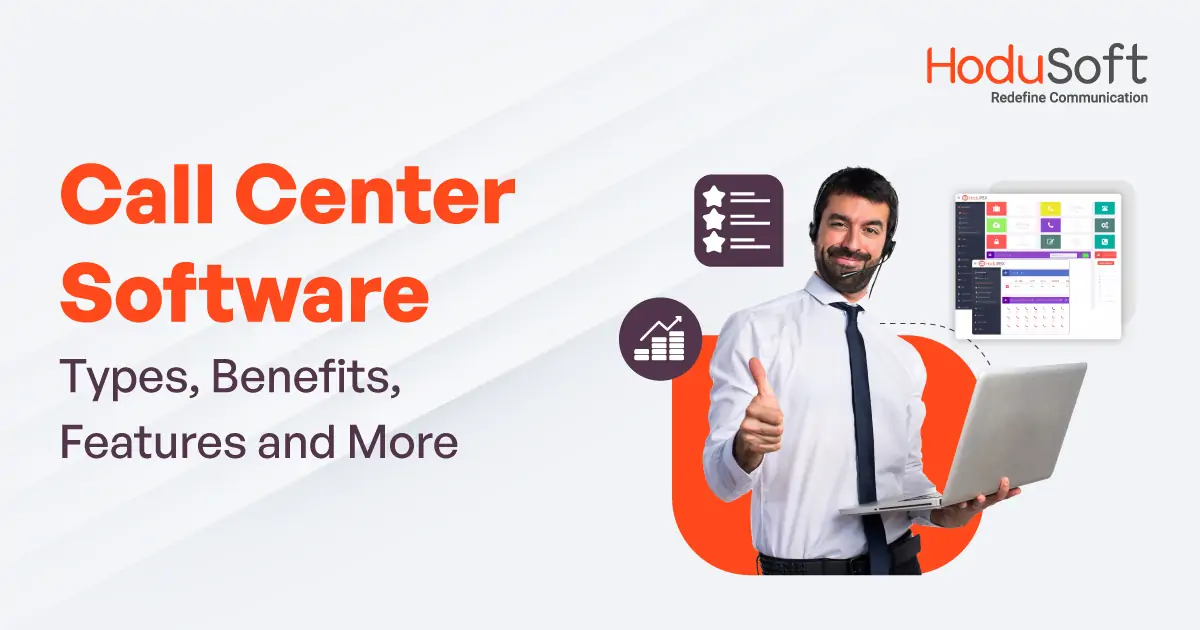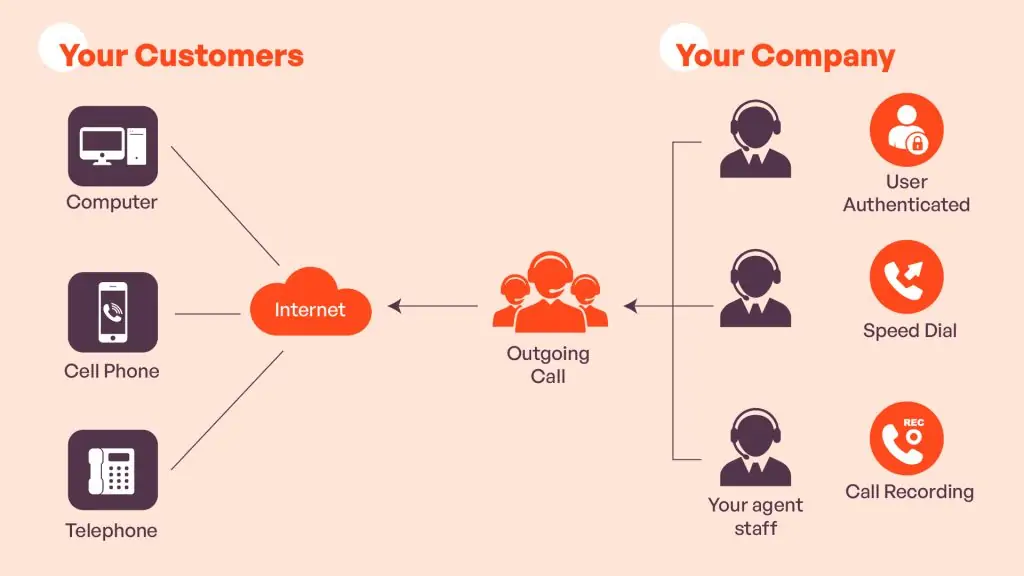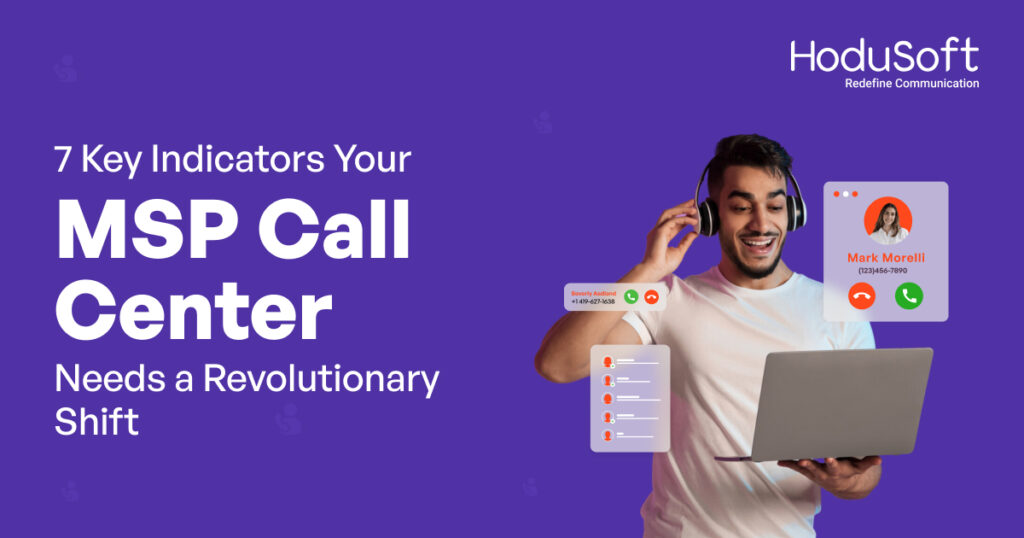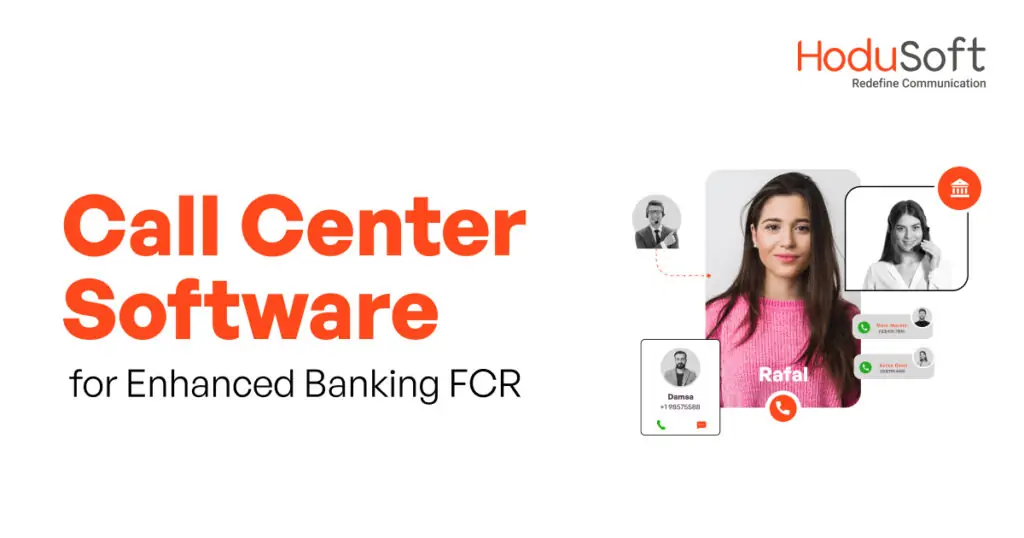What is Call Center Software? - Types, Benefits, Features and more
The advent of the telephone made it easier for businesses to communicate with customers in real time. That marked the beginning of ‘call centers.’ But with changing times and a rapidly evolving digital landscape, traditional telephones and switched networks aren’t adequate to handle a torrent of incoming calls or make a massive volume of outgoing calls suitable for a professional call center.
This is where call center software allows businesses to provide quick, effective, and trustworthy customer service as well as manage multiple customer communication channels such as phone, SMS, instant messaging, live chat, email, and social media.
What is Call Center Software?
Call center software is a technology that consists of various advanced features and functionalities. It allows direct and effective communication between a business and its customers.
Types of call centers
When it comes to the classification of call centers, there are six types of call centers—inbound, outbound, automated, multichannel, omnichannel, and virtual call centers. Let’s discuss each in brief detail.
Inbound call center
As the name suggests, an inbound call center receives incoming calls instead of making outgoing calls. This type of call center specializes in customer service, product assistance, tech support, order placement, and more. Inbound call center representatives offer fast and effective solutions to customer requests and problems. Sophisticated inbound call center software routes incoming calls to the right agents and increases customer satisfaction.
Outbound call center
As the name suggests, an outbound call center makes outgoing calls to customers. Using this system, call center agents call customers to market products or services. High-quality outbound call center software can be integrated with customer relationship management (CRM) software. This allows call center representatives to access accurate customer information and history to enhance customer experience.
Automated call center
As the name suggests, an automated call center uses automated systems to enhance agents’ productivity and reduce costs. These call centers manage voicemails, help customers find nearby store locations, and perform many such routine activities that are programmed in the automated systems.
Multichannel call centers
Multichannel call centers integrate multiple communication channels and allow businesses to provide customer service using different channels such as voice calls, SMS, instant messaging, social media, and others. It is useful in managing a wide range of communication activities such as managing order fulfillment as well as sending and receiving faxes.
Even though, like multichannel call centers, omnichannel call centers integrate multiple communication channels, the main difference is that the customer experience is unified across channels and it introduces automation between channels.
Virtual call centers
A virtual call center is not bound by a physical facility and it consists of customer service representatives who work remotely. This type of call center has gained popularity in recent years as it is extremely flexible, scalable, and affordable.
How Does Call Center Software Work?
Call center software typically uses Voice over Internet Protocol to make and receive phone calls over the internet and not over phone lines. It work in the following ways:
- The software identifies the caller by browsing the unique entry in the database. The software adds a new entry for future reference if the caller’s name is not in the database.
- If the caller’s entry is in the database, the agent assesses the records and gets the customer’s relevant details and issue history before taking the call.
- After the caller replies to the automated response, the call is queued as per the mapping in the database.
- When the call is pushed further, agents that are mapped to the queue can take the call automatically or pick it up manually.
- After picking up the call, the agent can speak with the caller and help them however possible.
- In case the agent is not able to resolve the issue, the software keeps the status and interactions, which helps the agent follow up regularly and keep track of the progress.
- Depending on the caller’s response, the agent can mark the status as resolved or open or needs follow-up. Once the status is ‘closed,’ the caller receives an automated survey for feedback
Read Also: Call Center Technology Trends Every Business Leaders Must Know
Features of a reliable call center software
Sophisticated call center software comes with the following features:
- Predictive Dialer: A predictive dialer uses algorithms to automatically dial calls to customers from a list of contacts.
- Progressive Dialer: A progressive dialer only connects calls with the customer once the agent answers the call.
- Skill-based routing: It routes incoming calls to the right agents based on their experience and expertise in handling specific queries and requests.
- Call Recording: It records every call to monitor the communication and store them for training and quality purposes.
- WebRTC technology: It enables web applications and websites to add and stream audio and/or media communications directly between browsers and devices.
- Multi-level IVR: The Interactive Voice Response (IVR) offers self-help features to customers and allows them to communicate with the right agents in the right department.
- Real-Time Analytics and Reports: It provides real-time insights to track and analyze employees’ performance and generate various custom reports.
- Integrations: A high-quality call center software integrated with several customer relationship management (CMS) software as well as SMS systems.
- Audio conferencing: This feature allows agents to schedule conferences, host conferences, record conferences, as well as mute or unmute participants.
- Auto-provisioning: This feature decreases manual operations by automating data import, regular updates, and regular configuration.
Benefits of call center software
The introduction of call center software became a major turning point for the call center industry. It heralded massive positive changes for all types and sizes of call centers by offering the following benefits:
1. Lower costs
Studies have shown that call center software helps businesses save up to 90 percent of their international call costs and 40 percent of their domestic call costs. By leveraging sophisticated call center software, businesses can save on expensive hardware, installation costs, and several other costs associated with traditional phone systems.
2. Scalable
The contemporary call center software is highly scalable and it allows businesses to scale up and down their operations as per their team strength and operational requirements. Using it, businesses can optimize their operations during peak time as well as lean periods at no additional cost.
3. Flexible
Traditional phone systems are tied down to one place and need a landline connection to handle calls. But call center software just needs an internet connection and enables agents to work from anywhere without being tied to their office desks.
4. Robust security
Call center software comes with enhanced security protocols, which makes it extremely secure and tamperproof. While traditional phone systems can be easily tapped, call center software can’t be eavesdropped on or compromised with such ease.
5. Enhances productivity and customer satisfaction
Equipped with sophisticated features, high-quality call center software enhances the productivity of customer service representatives as well as provides fast and optimal customer service, which in turn enhances customer satisfaction.
6. Effective call handling and queuing
When it comes to handling and queueing the flow of incoming and outgoing calls, nothing can beat reliable call center software. Whether it is outbound calls or inbound ones, call center software is designed to handle all calls efficiently. The ‘First In, First Out’ approach of call center software streamlines queuing.
7. Easy installation and maintenance
Call center software is extremely easy to install and maintain. It just requires a web browser to run effectively and it eliminates the hassle of paperwork and time spent on installation.
Things to consider when choosing a call center software
If you are still using outdated call center software, then you might be facing a lot of challenges. By upgrading your software, you will not only be able to tackle various challenges with ease but also be able to provide superior customer service. Therefore, you must choose your call center software carefully, keeping in mind your key requirements and various essential factors.
Let’s look at some of the key factors that you must consider when looking for call center software:
Size of your business
The first and foremost thing that you need to consider is the size of your business. If the size of your business is small (50-100 people), then investing in software that can accommodate a huge number of people (around 500 people) would be pointless.
It is also advisable to analyze the minimum volume of calls that you receive or assume to receive in a particular time frame. This will again help you to determine the best suitable software for your company.
User-friendliness and customization options
Choose user-friendly software. User-friendly software makes it easier for users to handle and manage complex tasks just like simple ones. Using outdated software for complex tasks is not only time-consuming but expensive as well.
Also, make sure that the software offers customization options to accommodate the unique requirements of your business.
Easy integration
In today’s time, businesses look for software that allows easy and smooth sharing of information from one business tool to another. This leads to efficient communication between call center agents and their customers.
Therefore, choose a call center software that integrates well with all the essential business tools such as CRM, helpdesk system, marketing platform, social media platforms, etc. By integrating the call center software with other tools, you will be able to enhance your efficiency as well as productivity.
Data security and compliance
The data security breach is one of the major concerns of many businesses these days. Therefore, it is more crucial than ever to select software that comprises a robust security system. The software that you choose must ensure that all the personal information of your customers remains encrypted.
Thus, whatever provider you choose, make sure they follow all the requisite compliance rules and offer various contingency plans for data security.
Scalability and Reliability
If you are planning for expansion in the future, make sure to choose software that can scale with your business. Scalability can be anything. It can be adding more workforce, additional features, capabilities, or a combination of all.
Other than scalability, the most important factor that you should not ignore is the reliability of the software. Unexpected things can happen anytime like power outages, phone line outages, or natural disasters that can pause or disturb the entire communication process. Therefore, choose reliable software that can route the calls to another appropriate destination or agent in the event of an emergency.
If you keep all these factors in mind, you will be able to make an informed decision related to choosing the right call center software. Selecting a system that fits your specific needs perfectly will improve your customer service experience. Moreover, it will also boost your Return On Investment (ROI).
Future of call centers
In the last few years, the call center industry has undergone a massive transformation due to various factors, which include the evolving digital landscape and the rise in the remote or hybrid model of work. Here are the key areas in which call centers are likely to change.
Adoption of automated tools
As per the stats released by Dimension Data, three-fourths of respondents said that they will choose a business’s website over phone calls, SMSes, live chats, or social media for customer support. Another stat revealed that over 40 percent of customers will prefer self-service to human interaction.
Keeping this in mind, many call centers have started adopting automated and AI-powered tools to provide self-service as well as enhance efficiency and reduce costs. In the coming years, many more are likely to follow the suit.
Use of social media to provide customer service
A recent survey found that close to 80 percent of customers use social media platforms to engage with businesses. One more study indicates that over half of respondents who participated in it said that they’re more likely to buy again from a business that responds to their social media messages.
Even as a majority of businesses are leveraging social media as a digital marketing tool, they will provide customer service from their social platforms such as Facebook, Twitter, Instagram, and more. Many small and medium businesses have started using Twitter and Facebook to deal with customer complaints and requests and the adoption is only going to increase in the coming years.
Hybrid and remote working models will be the new norm
Since the pandemic, the remote and hybrid model of working has become the new norm and it’s not going away anytime soon. According to the estimates of Gartner’s 2021 Future of Work from Home for Support and Service Employees report, nearly 90 percent of customer support and service leaders and 80 percent of call center agents will work remotely till 2024.
A majority of call centers will optimize their calling systems to support remote and hybrid work and will invest in more sophisticated software and collaboration tools. Many call centers will use cloud-based software and equip their team to efficiently work from remote locations.
By and large
As the call center industry evolves rapidly, the adoption of the right tools becomes more critical than ever before. One such tool is the right call center software, which can mean the difference between average customer service and exceptional experience and satisfaction.
HoduCC is one of the best call center software that is loaded with sophisticated features to meet the needs of all types and sizes of businesses. Be it inbound or outbound calls, the contact center software is designed to handle massive volumes of calls efficiently as well as track and generate real-time reports. To learn more about the call center software, get in touch with our sales team at [email protected] or call us at +1-707-708-4638.




